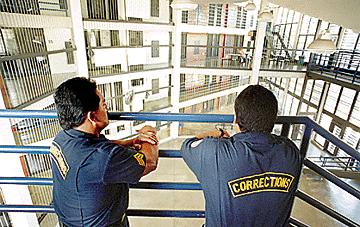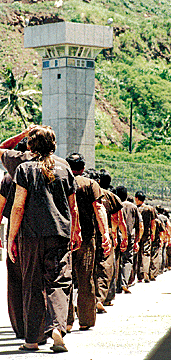
Tired of politicians setting your agenda? Get involved! In the weeks leading up to the Sept. 21 Primary Election, let's talk story about politics and the positive changes it can bring, just like we might do with friends sitting around the patio. Each Monday, we'll report on a community concern - and have candidates offer solutions. Then we'll open our call-in line to let you query the candidates. We'll ask some questions on your behalf and print the answers later that week.


Corrections officers overlook one of the prisoner modules in Halawa Prison.
Photo by Dean Sensui, Star-Bulletin
Spear, a 28-year-old Kaneohe woman who was serving time for check forgery, wanted conditions at the women's facility and the Oahu Community Correctional Center declared unconstitutional.

Inmates at Halawa go off to lunch.
The entire module goes all at once,
walking along "Main Street"
in single file.
"It was like a 19th-century dungeon," recalled Bronstein, now director emeritus of the ACLU's National Prison Project in Washington, D.C. "It was torture there."
As legislative candidates gear up for another election season, prison overcrowding remains an issue. All parties agree the state has made significant strides in improving the two institutions since a 1985 federal consent decree to settle Spear's lawsuit; the Public Safety Department boasts it has satisfied 90 percent of the decree's requirements.
But for the eight-facility prison system, the big problem continues to loom in a cash-strapped state: There's not enough room behind bars for the people now sentenced, or for the increase expected by the turn of the century.
"I think everyone in the public safety system and people in the community believe we need more bed space," said attorney Dan Foley, the ACLU's local representative on prison reform. "The question is, what type of bed space?"
An Aug. 4 head count showed state prisons were at 115 percent of maximum capacity, housing 3,051 inmates in space designed for 1,754, but adequate for 2,650.
All facilities had some overcrowding, with occupancy rates ranging from 104 percent at OCCC to 154 percent at the Hawaii Community Correctional Center on the Big Island. Like other neighbor-island prisons, HCCC has absorbed some prisoners so the two facilities under the consent decree can approach population caps.
The numbers do not include 300 inmates the state flew to prisons in Texas in December. And the department projects at least 700 more medium-security beds will be needed in the next four years to meet a growing population. An October report said the number of Hawaii inmates rose 19.5 percent from 1990, part of a national trend that has seen adult incarceration since 1985 climb 43 percent.
One possibility for a quick solution faded when Gov. Ben Cayetano, grappling with the state's fiscal crisis, decided to scrap his predecessor's plans for a 1,000-bed prison on the Big Island and devote funds to public education instead. The administration and lawmakers have looked at other options, such as privatization, boot camps - where fit, small-time offenders are subject to strict discipline - and using tentlike structures in place of traditional "hard cells," which officials said can cost up to $150,000 each.
The president of the nation's largest prison management firm, the Nashville, Tenn.-based Corrections Corporation of America, told state lawmakers last session that it could finance construction of a prison in Hawaii and include the building costs in a lease arrangement. Proponents argue competitive forces will save the government money, while opponents - including unions - contend that profit motives will lead to lower wages and reduced standards.
Officials estimate expansion and renovation projects already given the green light will add some 350 beds. Officials, meanwhile, are jumping on any promising space like renters in a tight market. Honolulu Prosecutor Keith Kaneshiro, who has been named to head the Public Safety Department in January, wants to use barracks at the Barbers Point Naval Air Station for a drug detention center once they are vacated. And Cayetano has been working to secure for state use half of a planned 650-bed federal detention facility, a spokeswoman said.
Bronstein urged Hawaii to chart its own course - forestry and marine programs, for instance, might be more appropriate than boot camps. He hopes a long-term management plan that has been delayed for years will be finished soon and include a mix of alternate programs, along with the release of low-risk pretrial defendants and shorter prison terms to free prison space.
"We need to use prisons sparingly," he said. "It's the most expensive, least effective sanction that we have."
Lawmakers, though, will face voters who rank crime as the No. 1 issue and believe judges already are too lenient. Hawaii had the fourth highest crime rate in the nation last year, and the tourism industry is starting to worry. Legislators last session passed get-tough laws like mandatory sentences for "ice" dealers, but that could further stress the prison system. Even if tents are used, more money for operating costs - which make up 70 percent of Public Safety's $98 million annual budget - could be needed.
"It's a matter of priorities," said department spokesman Gregg Takayama. "If crime is a big priority, and if prisons are a big priority, then it should go to the top of the list."
Hawaii has not been particularly slow in complying with the consent decree; Rhode Island, which has a prison system the same size, took 20 years.
But Agnes Spear will not see the improvements her lawsuit brought. On New Year's Eve 1989, she was fatally stabbed while watching television in the recreation room of the women's facility. Her assailant, now serving a life term in California, was a spurned lover who had sneaked a 14-inch knife past lax guards.
Spear, who won praise for advocating prison reform, hoped to become a paralegal upon her release. Tragically, the changes will come too late for her to realize her dream.